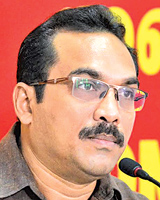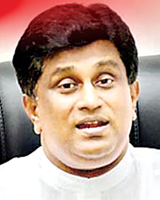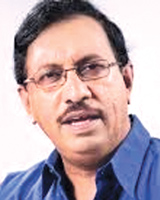The political parties represented in the Constitutional Assembly are currently striving to find common ground over the key chapters of the new Constitution that is in the making.
While the two main parties, the SLFP and the UNP showed enhanced commitment in reaching a consensus over the remaining highly contentious issues, such as, the abolition of the Executive Presidency and planning the contours of a new electoral system, the minor and minority parties were struggling to ensure a fairer share of Parliamentary representation among other issues.
In the midst of these developments, some of the key stakeholder parties spoke to the Sunday
Observer on their expectations and commitments in the whole process of drafting a new Constitution.
Prof. Tissa Vitharana (Leader of LSSP)
We are strongly for the abolition of the executive presidency. The executive presidency has not evolved as part of our culture or indigenous politics.
After the Donoughmore Constitution, and universal adult franchise was granted to Lankans in 1931, people were used to the Westminster model of parliamentary system. This system has evolved through the needs and customs of the people of Sri Lanka. It is an integrated political mechanism, and has resulted in democracy being strengthened in the country. Especially, after the 1972 Constitution, sovereignty was vested with the people.
 In countries like the US and France executive presidential systems have evolved historically over a period of time with necessary safeguards. When that system is artificially grafted here, we have a situation where powers that were given to the people over the executive, legislature and legal functions being divided between Parliament and the separately elected President. As a consequence of this there is perpetual disagreement between the executive and the legislature, especially, when these two are from two different political parties. The ultimate result of this is a breakdown of governance.
In countries like the US and France executive presidential systems have evolved historically over a period of time with necessary safeguards. When that system is artificially grafted here, we have a situation where powers that were given to the people over the executive, legislature and legal functions being divided between Parliament and the separately elected President. As a consequence of this there is perpetual disagreement between the executive and the legislature, especially, when these two are from two different political parties. The ultimate result of this is a breakdown of governance.
Election of PM
-We believe the election of the Prime Minister should be by Parliamentarians elected by the people. Parliament itself should elect the Government. Both, the Cabinet and the Prime Minister must have the confidence of Parliament and also be answerable to Parliament. We support such a system.
The electoral system
The LSSP is for a system of election where each elected representative is directly chosen by the voter in a smaller electorate instead of the district. The current system prevents good people from being elected, since a large amount of money gives the affluent an advantage when it comes to winning votes. The linkage of elected representatives being responsible for his voter has been lost. The change brought in by the 1978 Constitution has disrupted the whole indigenous process.
Basically, we are for something that banks on the German system - to have two ballot papers, one to choose the political party. What we have evolved at the deliberations so far is not exactly the German system but a mixed system where 60% of candidates will be selected on the First Past the Post system and 40 % from the National List. The LSSP has agreed to this compromise on the working draft of the new Constitution but a final decision on the contours of the future electoral system, by all political parties is still pending.
TheLSSP made written representations to the sub-committees set up by the Constitutional Assembly. (Prof.Tissa Vitharana was summoned before two sub-committees and the Steering Committee chaired by the Prime Minister.)
Second Chamber
The LSSP supports a Second Chamber in the House. It was one of the proposals of the All Party Representative Committee (APRC) which I chaired in 2006. The APRC was mandated to develop a draft proposal for constitutional reform.
The Second Chamber provides for taking into consideration provincial rights when drafting legislature in Parliament. It will consist of people of eminence. The members of the Second Chamber can propose modifications to new legislation that concerns the provinces and then Parliament can review the draft legislation before it becomes law.
North and East merger
With regard to the North and East merger, we are totally opposed. There are fears of separation which is still being nurtured by extremists in the North as well as pro-LTTE Diaspora. At the time terrorism was widely used for the demand of secession. In this context, we have to allay the fears of the majority community.
Within a unitary state we can have an optimal level of devolution which is mutually agreeable, and go for expanded devolution once mutual trust and confidence are built up.
Provincial police
We believe, a provincial police commission is unnecessary at this stage. There may be a reason to have provincial police commissions in a country like India where the state units are much bigger and diverse in all aspects. We should have a single police commission for the whole country. There can be DIGs for each province, to work with the IGP and the Chief Minister to maintain law and order. Recruitment should be uniform for the whole country but the number of recruitment can reflect the ethnic composition of the Province.
With the passage of time, as a starting point there can be room for ‘provincial’ community-police for functions like traffic control.
JVP National Organiser and MP Bimal Ratnayake
Our party strongly believes in the abolition of the Executive Presidency. It is the key mandate upon which this government was elected to office.
In 1994 and 2005 the abolition of the executive presidency was just one among many other promises in the respective election manifestos of political parties, elected to power. But, it was the main pledge of this government. At the Constitutional Steering Committee there was a proposal to replace the executive president by an executive Prime Minister. This was a proposal by the UNP. But, we opposed it, we said the issue is not with the name.
 The Northern Provincial Council has submitted a document to the Centre Periphery Relations subcommittee asking to merge the North and East Provinces. The powers they ask go beyond federalism, and is something of a confederation. We have opposed this proposal. There are all sorts of weird proposals to the Steering Committee but it does not mean that all of it will be taken on board.
The Northern Provincial Council has submitted a document to the Centre Periphery Relations subcommittee asking to merge the North and East Provinces. The powers they ask go beyond federalism, and is something of a confederation. We have opposed this proposal. There are all sorts of weird proposals to the Steering Committee but it does not mean that all of it will be taken on board.
The TNA has been very reasonable at the deliberations. They have called for the full implementation of the 13th Amendment while acknowledging that their demands should win over the trust of the other communities, including the Sinhalese.
So far, there is no final written document by the JVP, outlining the party stance. But, we have been highlighting our position at all levels, in the sub-committees as well as the Steering Committee.
There has been no proposal or move by any political party to take away the current ‘foremost’ status enjoyed by Buddhism in the Constitution.
These rumours are spread by extremists. It was a point raised at the Public Representations Committee. No political party has made any such request.
We believe, this is the best time to bring in a people friendly Constitution. The government does not enjoy a majority in Parliament, therefore it is compelled to go for an inclusive process.
All previous efforts for a new Constitution were brought in as a means to empower the sitting rulers. Their wishes were steamrolled on the people. During the era of President Mahinda Rajapaksa in 2010, the 18th Amendment (extending the term of the President) was forced upon the people. Their intention was to hang on to power.
At the next Steering Committee meeting the working draft of the Constitution will be further reviewed to narrow down the proposals. I believe it would take considerable time before we can come up with a final document.
The President has openly said, he is ready to abolish the Executive Presidency but some senior SLFP Ministers are against it. This matter should not drag on forever. The Executive Presidency is not a cure for all ills. It is a myth to believe it will be the only safeguard against separation or another ethnic conflict in Sri Lanka.”
Deputy Minister, Deputy Government Whip and member of Law and Order Sub-Committee Ajith P. Perera:
We are not ready to compromise on the nature of the State, abolition of the Executive Presidency and Article 9 of the Constitution which says that foremost place is given to Buddhism. On all other issues that are currently being discussed, the UNP is ready to find middle ground.
 We are 100 per cent for the abolition of the Executive Presidency. That was clearly stated in the UNP’s policy statement at the last General Election. We have not deviated from that stance.
We are 100 per cent for the abolition of the Executive Presidency. That was clearly stated in the UNP’s policy statement at the last General Election. We have not deviated from that stance.
With regard to the election of the Prime Minister we are open for discussion. Parliament can decide on the best option. Still there is no final agreement on the matter. There are three options being deliberated upon at present - the direct election of the PM, pre-nomination by political parties and the (present) Westminster system.
When the whole Parliament meets as the Constitutional Council, members will take up these three options of electing the Prime Minister. Replacing the Executive Presidency with an executive Prime Minister is not one of the proposals under consideration now.
The nature of the state has to be a unitary one, our party supports maximum devolution within a unitary state. This too is mentioned in our policy statement. There is no question of going back on that promise.
On the electoral reforms, we have no rigid policy, the party is open to discuss the Westminster system, First Past the Post system (FPP) or a mixed system of elections combining FPP and Proportional Representation.
The election process will be intertwined with the election of the Prime Minister. We will not support a pure manape (preferential) system. We want to abolish the preferential system for it breeds rivalry even among own party members.
With regard to the proposal for the merger of the North and East provinces, our belief is that it is impossible. A people’s referendum is a pre-requisite for such a step as the final hurdle to pass the draft Constitution. If even a single proposal in the draft is disapproved by a majority of the Sinhalese or the Muslim community, the process is bound to fail. Therefore, we believe it is not a realistic proposal.
The UNP is open for discussion on the proposal for a Second Chamber or Senate . There are different views among various stakeholders on the Second Chamber, we don’t have a fixed standpoint. We are ready to meet half way so the best option will emerge at the discussion table. The composition and the nature of the Second Chamber again depend on the abolition of the Executive Presidency and the electoral system. All these need to be discussed simultaneously.
There is no final agreement on the composition of the National List. But I believe it is not a difficult subject, we can reach a compromise on the best formula before long. The options discussed now are a bigger National List or whether to have a provincial list to secure the provincial representation, and there is also focus on women’s representation in the National List.
The idea is to have an inclusive system. There is a discussion to eliminate under representation by minority/minor parties and over representation by the major parties in the House. Everyone is in agreement that the new system must be fair to minor and minority parties.
The working draft mentions there will be 233 seats in Parliament under the new Constitution, of which 60 % (140 seats) will be elected members under First Past the Post system and 40 % (93 seats) as compensatory seats.
The compensatory seat is the option for the National List. There is no agreement yet, if it would be a National List or a provincial list.
Disaster Management Minister and senior SLFP member, Anura Priyadarshana Yapa:
The SLFP believes the Executive presidency is an integral part of the present provincial council system introduced under the 13th Amendment. The Executive Presidency in its present mode is not as harmful as the all too powerful office that existed prior to 2015.
 Many powers of the Executive President have now been transferred to Independent Commissions and Parliament. The President’s office no longer enjoys arbitrary powers to dissolve Parliament. The Independent Elections Commission has been set up, the Constitutional Council is there.
Many powers of the Executive President have now been transferred to Independent Commissions and Parliament. The President’s office no longer enjoys arbitrary powers to dissolve Parliament. The Independent Elections Commission has been set up, the Constitutional Council is there.
The Executive President is leaning towards the much awaited democratic way of thinking of the people who opposed it. There is a general perception among the vast majority of the people and some political parties that the Executive Presidency should be retained.
There is general consensus that the country was affected in many wars because the genuine grievances of the Tamil community have not been properly addressed, constitutionally. Our aim is to bring in amendments that are amenable to all communities. The 13th Amendment will have to be implemented, but I don’t think we can go beyond that. In the process the majority Sinhalese too must not feel marginalized. We need to strike a balance based on the wishes of the people.
On the electoral proposals, there is no consensus on the 60% to 40% proportion. The SLFP too has not come to a conclusion on that. But we are of the view that the current system must change, there is serious discussion on that.
As regards the Second Chamber, we believe it is a good proposal. We do not oppose it. I believe the Prime Minister should be appointed by the Members of Parliament – the Westminster system.
We oppose the merger of the North and the East. Whatever comes out of the deliberations should be a unitary form of government. We can support maximum devolution within a unitary state.
Key proposals in the Constitutional working draft of the Steering Committee of the Constitutional Assembly
* Abolition of the Executive President
* Election of Prime Minister –
a). direct election
b). pre nomination by the parties
c). Westminster system (nomination by Parliament)
* Parliament to have two chambers – second chamber consisting mainly of eminent persons nominated from the provinces, having powers to seek a review of draft legislature concerning the peripheries.
* The appointed PM shall not be removed from office within the first two years of his term, except by the passage of a no confidence motion with a two thirds majority or the defeat of the Annual Appropriations Bill in Parliament.
* The draft upholds no proposal demanding merger of Provinces
* A proposal to add special clauses to bar any attempt towards secession
* Upholds the unitary nature of the state with foremost place for Buddhism
* Parliament to have 233 seats, 60% elected by the FPP and 40% compensatory seats (national list or provincial list)
* Provisions to have a national police commission and a provincial police commission
* With regard to state lands, a high powered Tribunal appointed by the President to have binding powers on the state/provinces. Appeals against decisions of the Tribunal can only be filed in the Constitutional Court.
